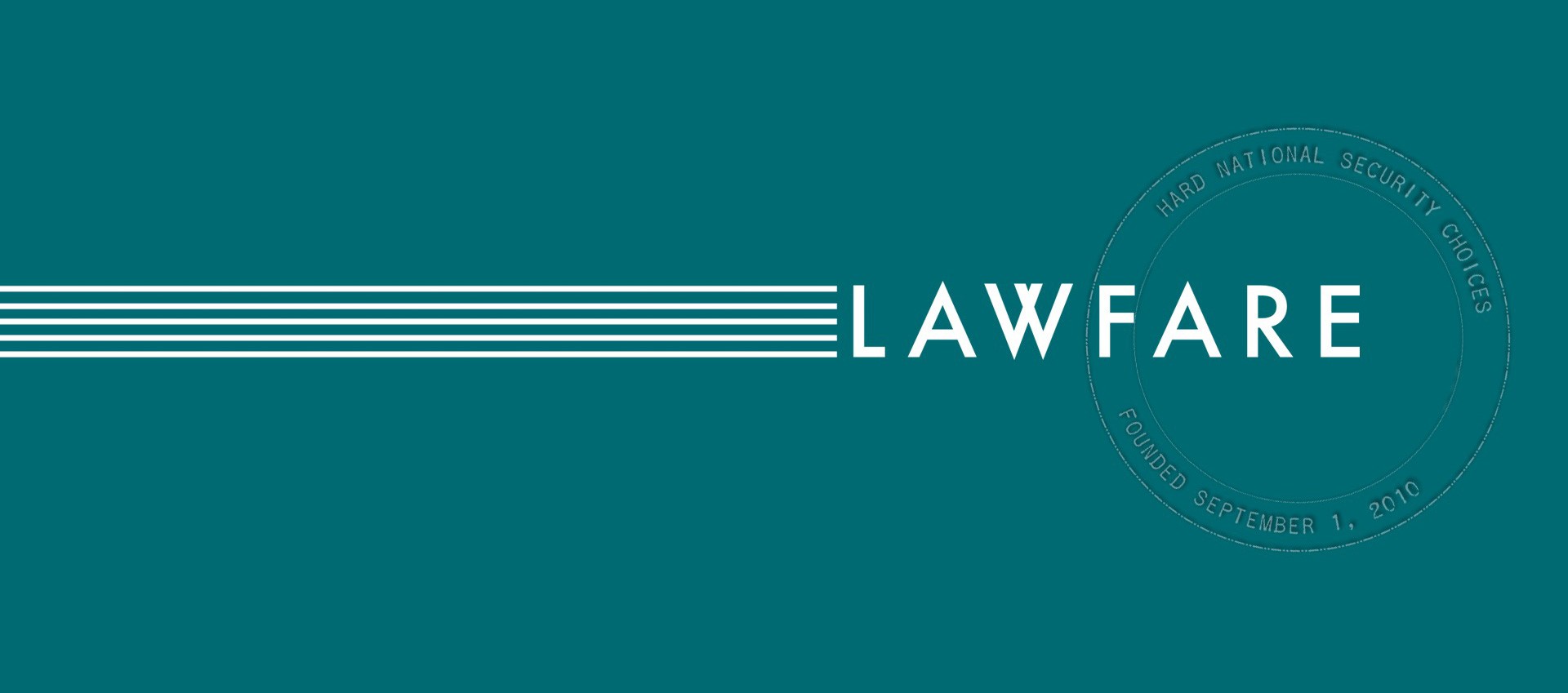The Week That Was: All of Lawfare in One Post
Your weekly summary of everything on the site.

Published by The Lawfare Institute
in Cooperation With

Anna Bower, Quinta Jurecic, Tyler McBrien, and Benjamin Wittes reported from the New York Supreme Court, Criminal Term, where Michael Cohen finished his testimony, Robert Costello had a fiery exchange with Justice Juan Merchan, and the parties’ proposed jury instructions in former President Donald Trump’s hush money trial.
Bower, McBrien, Katherine Pompilio, and Wittes reported on Cohen’s cross-examination and the end of his testimony in Trump’s hush money criminal trial.
Jurecic considered the decision by federal prosecutors in the Southern District of New York to not charge Trump for the hush money charges following an investigation and what that might suggest about the strength of District Attorney Alvin Bragg’s ongoing case.
On May 23, Wittes spoke to Bower and Roger Parloff for this week’s episode of “Lawfare Live: Trump’s Trials and Tribulations.” If you couldn’t attend the live event, the recording is available on Lawfare’s YouTube channel or later on the Lawfare Podcast feed. You can also watch all other post-court dispatches here:
On May 21, Pompilio spoke to Bower, McBrien, Jurecic, and Wittes for Lawfare’s post-court dispatch. If you couldn’t attend the live event, the recording is available on Lawfare’s YouTube channel or later on the Lawfare Podcast feed. You can also watch all other post-court dispatches here:
On Lawfare No Bull, Maya Nicholson shared the oral argument before the United States Supreme Court on April 25 in Trump v. United States, Trump's appeal of the D.C. Circuit's rejection of his claim that presidential immunity shields him from being prosecuted by special counsel Jack Smith for alleged attempts to subvert the outcomes of the 2020 presidential election:
On Rational Security, Alan Z. Rozenshtein, Jurecic, Scott R. Anderson, and Wittes sat down to talk over the week’s big national security news. They discussed the near ending of Trump’s criminal trial in New York and the approaching verdict, the request for arrest warrants by the prosecutor for the International Criminal Court (ICC) targeting Hamas’s senior officials and Israeli Prime Minister Benjamin Netanyahu (among others), the Biden administration following Trump’s administration in imposing major tariffs on imports from China, and more:
Nicholson shared ICC Prosecutor Kharim Khan’s statement and report, after he filed applications for arrest warrants against Netanyahu and Hamas leader Yahya Sinwar, among others, for war crimes and crimes against humanity committed on and following the Oct. 7 attack on Israel.
Chimène Keitner unpacked Khan’s applications for seeking arrest warrants for three Palestinian and two Israeli leaders—most notably Netanyahu and Sinwar—for war crimes and crimes against humanity committed in Israel and Gaza.
On Lawfare Daily, Anderson sat down with Keitner to discuss the recent applications for arrest warrants filed by the prosecutor for the ICC, accusing several Hamas and Israeli leaders of crimes against humanity and war crimes. They discussed the nature of the allegations, how the ICC has come to exercise jurisdiction over the Gaza conflict, and more:
Nicholson shared the International Court of Justice’s (ICJ) May 24 order indicating new provisional measures against Israel in South Africa v. Israel, regarding its military operations in Rafah.
Matt Gluck shared a transcript of South Africa’s oral argument before the ICJ, in the case of South Africa v. Israel.
Chile Eboe-Osuji dismissed the possibility of establishing immunity for heads of state before international courts. He considered the diplomatic consequences of international criminal prosecution, national versus international immunity, and how world leaders’ international conduct has generally improved after World War II.
In this week’s installment of Lawfare’s Foreign Policy Essay series, Reuben Dass explained how the terrorist group, Islamic State-Khorasan (IS-K), has used virtual planning—providing guidance via virtual means to operatives in target countries—as a means of inspiring and guiding terrorist attacks, while also identifying shortfalls for counterterrorism measures.
Also on Lawfare No Bull, Nicholson shared the Senate Appropriations Subcommittee on Defense hearing, where Secretary of Defense Lloyd Austin and Joint Chiefs of Staff Chair Gen. Charles “CQ” Brown testified about President Joe Biden’s 2025 Defense Budget Request. Several senators inquired about the Biden administration and Defense Department pausing the shipment of aid and weapons to Israel during their ongoing conflict with Hamas, and other topics, including deterrence, nuclear capabilities, and more:
On Lawfare Daily, Hyemin Han sat down with Matthew Erie to discuss Florida’s effort to address the perceived national security threat of Chinese influence by preventing Chinese citizens from owning property in the state. They talked about what makes the Florida law and the ongoing litigation challenging it particularly notable, the state of property rights challenges against Chinese citizens across the U.S., and more:
Elise Thomas analyzed the efforts of Spamouflage, a Chinese influence operation, to sway and engage users on social media platforms. Thomas found that although the operation has been “widespread” but “ineffective” in the past, its recent attempt at targeting pro-Trump communities could be successful in China’s attempt to influence U.S. elections.
On Lawfare Daily, Stephanie Pell sat down with Robert Silvers to discuss a report issued by the Cyber Safety Review Board examining the Summer 2023 Microsoft Exchange Online Intrusion. They discussed the board’s determination that the intrusion was preventable and should never have occurred, Microsoft’s response to the report, and the board’s unique role as a true public-private partnership, and more:
Also on Lawfare Daily, Eugenia Lostri sat down with Kevin Frazier to discuss undersea cables, which carry more than 95 percent of the world’s digital traffic and are constantly vulnerable to a range of threats. They talked about the different types of threats to undersea cables, the importance of redundancy, and more:
Frazier unpacked the Bipartisan Senate AI Working Group’s report entitled, “Driving U.S. Innovation in Artificial Intelligence: A Roadmap for Artificial Intelligence Policy in the United States Senate."
In the latest installment of Lawfare’s Digital Social Contract paper series, Peter N. Salib examined why, in the age of increasing artificial intelligence (AI) capabilities, the risk of explosive cycles of AI self-improvement is not as great as it seems. Salib explained how the unrecognized incentive of an AI system more capable than its creator cuts against AI self-improvement and therefore reduces the risk.
On Lawfare Daily, Rozenshtein sat down with Salib to discuss the prospect of AI self-improvement and the possibility of a rapid explosion of AI capabilities, which Salib writes about in his new white paper for Lawfare’s ongoing Digital Social Contact paper series. They talked about why it is difficult for humans to align AI systems, why that means AI systems themselves will hesitate to improve, and more:
Matthew van de Merwe, Ketan Ramakrishnan, and Markus Anderljung proposed using tort law as a mechanism to mitigate the risks posed by frontier AI and incentivize companies–such as OpenAI, Meta, and Google DeepMind—to adopt responsible safety practices, until effective administrative regulation can be implemented.
Salib explained how the dissolution of Superalignment—OpenAI’s team dedicated to addressing the concerns and dangers of building smarter-than-human machines—poses significant risk to humanity.
Bruce Mehlman and Matt Perault identified an emerging “fourth phase” in internet-era technology policy: artificial intelligence (AI). They explained that emerging political divides between AI regulation optimists and skeptics will ultimately create political alliances and inevitably shape future AI policymaking.
In the latest installment of the Seriously Risky Business cybersecurity newsletter, Tom Uren discussed the U.K. government’s potential proposal for counter-ransomware measures, the arrest by U.S. authorities of Taiwanese-national Rui-Siang Lin for allegedly running the Incognito dark web marketplace, the U.K.’s National Cyber Security Centre’s Personal Internet Protection Service, and more.
On Chatter, Anna Hickey sat down with Tim Alberta to discuss his book, “The Kingdom, the Power, and the Glory: American Evangelicals in an Age of Extremism,” which puts American evangelicalism under a microscope as Alberta—a son of an evangelical pastor—grapples with how the community he grew up in has changed. They discussed what led him to write this book, the effects of the coronavirus pandemic on the evangelical community, how evangelicals talk about Christian nationalism, and more:
Alex Zerden reviewed Saleha Mohsin’s “Paper Soldiers: How the Weaponization of the Dollar Changed the World Order.”
And on April 3, Lawfare announced an auction item on the Givebutter campaign—the “Black Hole of Awful” Post-It by Jurecic, one-of-a-kind Lawfare sketch born from a conversation with Wittes that illustrates the extent to which trial delay is advantageous to Trump. Place your bids to support Lawfare’s Trump Trials coverage. You can also support Lawfare’s Trump Trials coverage by making a contribution here.
And that was the week that was.

